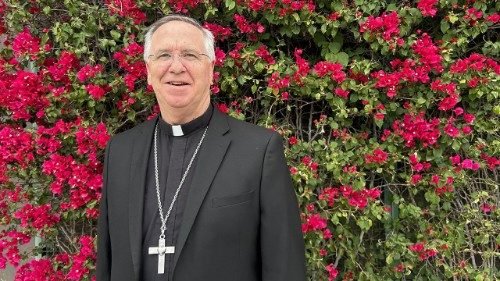On World Mental Health Day, Bishop John Dolan of Phoenix, Arizona, shares the work his US diocese is doing offer pastoral care to people who suffer from mental health challenges.
By Fr. Pawel Rytel-Andrianik
The education of priests and lay people, accompaniment in parishes for individuals with mental health challenges, and advocacy for institutional and societal support for those needing professional psychological or psychiatric care are the three essential components of mental health ministry in the Church, according to Bishop John Dolan of Phoenix
Speaking with Vatican News ahead of World Mental Health Day on October 10, Bishop Dolan said he is personally involved in this ministry.
He underscored the importance of eliminating the stigma surrounding mental health issues, saying: “There is no shame in having mental health problems. It is like someone with a broken arm.”
Education
Bishop Dolan noted that a crucial component of mental health ministry is education, stressing the need for both the clergy and laity to be well-informed about mental health services.
“Mental health ministry focuses on educating the people in the pews… but also training priests, religious, and deacons on the value of mental health services, including counselling, psychology, psychiatry, and neurology,” he said.
The Bishop noted that this education empowers clergy to speak about these issues and refer parishioners to professional help when needed.
Accompaniment
Another critical aspect of the ministry is accompaniment. Bishop Dolan explained that this involves creating spaces where people struggling with mental health issues, as well as their families, can come together to share their experiences.
“We have accompaniment, which allows people to gather, share their struggles with mental health, or maybe allow family members whose loved ones are living with mental health issues to navigate life at home,” he said.
The Bishop also highlighted the role of spiritual direction as a form of mental health support. “We do not diagnose, prescribe, or treat. We cannot do that for legal reasons, and it is not within our scope,” he noted. “We can offer spiritual guidance and assistance.”
Advocacy
Bishop Dolan emphasized the need for advocacy in promoting mental health services, speaking about at encouraging government support for mental health professionals and increasing public access to care.
“We try to encourage the government to ensure proper funding to educate students of psychology, psychiatry, and neuroscience,” he said, pointing out that the lack of sufficient counselors and psychologists is a global issue. “We need to advocate for that.”
Bishop Dolan shared the positive impact of mental health ministry on the lives of those involved.
“Thousands of people have responded beautifully to this mental health ministry,” he said.
The Association of Catholic Mental Health Ministers
Bishop Dolan highlighted the crucial work of the Association of Catholic Mental Health Ministers (CMHM), a lay organization that significantly supports the mental health ministry.
The CMHM describes itself as a “lay Association of the Christian Faithful whose members are called to be a healing presence in the lives of people with mental illness.”



